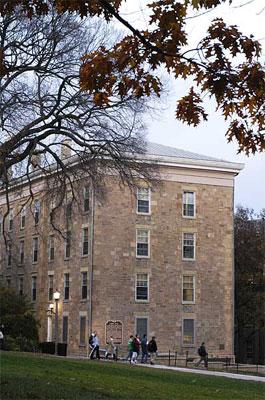 Presented with the opportunity to hire six new professors, John Coleman, chair of the Department of Political Sciences, admits he faced “a little bit of a puzzle.”
Presented with the opportunity to hire six new professors, John Coleman, chair of the Department of Political Sciences, admits he faced “a little bit of a puzzle.”
The new faculty lines gave him the opportunity to fill in gaps – and show that the University of Wisconsin-Madison remains one of the best places in the country to study political science. The trouble was he needed adequate start-up packages plus the salaries to put competitive offers on the table. Those packages allow new professors to set up shop, Coleman said. “It allows them to come here and hit the ground running on their research.”
That’s where Robert and Susan Trice and Jeffrey and Susanne Lyons stepped in, making key, unrestricted gifts that allowed Coleman to put together the packages he needed. “I knew I could put offers on the table that would be as strong as any offers these candidates would see,” he said. “Without the gift dollars, it would have been difficult.”
Coleman went six for six, bringing in top scholars of Latin American politics and government, European economy and politics, judicial politics, international relations with a focus on immigration, and political theory. He also had private dollars to encourage Scott Straus, a world-recognized scholar on genocide and ethnic conflict in Africa, to remain in Madison.
“The future of this nation depends on an educated citizenry with all of the skills needed to compete in the 21st century,” Robert Trice (’71 MA, ’74 PHD L&S), a retired senior vice president with Lockheed Martin Corp., said, adding public institutions such as the UW-Madison are necessary for that education. Private support allows a public university to successfully compete with well-endowed private institutions and compete for the best minds in the world when it comes to faculty. And it worked, Trice said, because of the start-up packages, the University successfully recruited world-class talent.
UW-Madison’s success means its political scientists are considering questions that will shape people’s understanding of the world:
- How does a country such as Rwanda, wracked by genocide and civil war, stage a recovery to refashion its politics, economy and society?
- How does union membership transform the political beliefs of its members?
- Do lower court judges’ rulings change when Supreme Court openings are expected?
While Straus, the Rwanda expert and faculty director of the Wisconsin Human Rights Initiative, values the UW-Madison tremendously, the retention package allowed him to stay without sacrificing “any part of my research agenda or feel that I was being penalized for my commitment to the institution.” The package also showed him that the University valued his work at a time when other institutions were signaling their interest.
Research funds allow Straus to travel to Africa for research, travel to conferences, purchase supplies and support graduate students. One of his books, “The Order of Genocide: Race, Power, and War in Rwanda,”won the 2006 Award for Excellence in Political Science and Government from the Professional and Scholarly Publishing Division of the Association of American Publishers.
Ryan Owens, a Lyons Family Faculty Scholar, was inclined to move to Wisconsin, where he has family ties. He also respects the top-tier political science department. The start-up package showed him the UW-Madison is making a commitment to continued research. Through his startup funds and external grants, he was able to hire about 10 undergraduate assistants and said he didn’t lose ground in moving from his position as a Harvard University assistant professor of government. His latest book, “The Solicitor General and the United States Supreme Court: Executive Branch Influence and Judicial Decisions,”is due out in April.
Resources at UW-Madison were far superior to those John Ahlquist, also a Lyons Family Faculty Scholar, was offered to remain at Florida State University. Those dollars are allowing him to travel to finish his book on unions and political mobilization that looks at why some unions are politically mobilized beyond the specific interests of their members, how leaders make political claims credible in the eyes of the membership and why they expand their scope of activity.
For Coleman, a key to the gifts was that they were unrestricted, allowing him to use them for his highest priorities. The department’s two biggest areas of need are, traditionally, faculty support and graduate funding, Coleman said.
While working with top faculty will draw top students, the department also competes for those students against other outstanding departments at Harvard, Princeton, Yale and Stanford. “We don’t need to match offers dollar for dollar,” he said. “But we need to be within shouting distance.” An additional unrestricted Trice gift also helped the department top up teaching assistant and fellowship stipends and provide seed funding for summer research.
Unrestricted funds provide many direct benefits to undergraduate students, Coleman said. In addition to bringing the best faculty and graduate students to the university as instructors, they support speakers series, undergraduate research, and unique educational opportunities such as participating in Model United Nations competitions and mock trial contests. “All aspects of our mission benefit from unrestricted funds,” he said.
